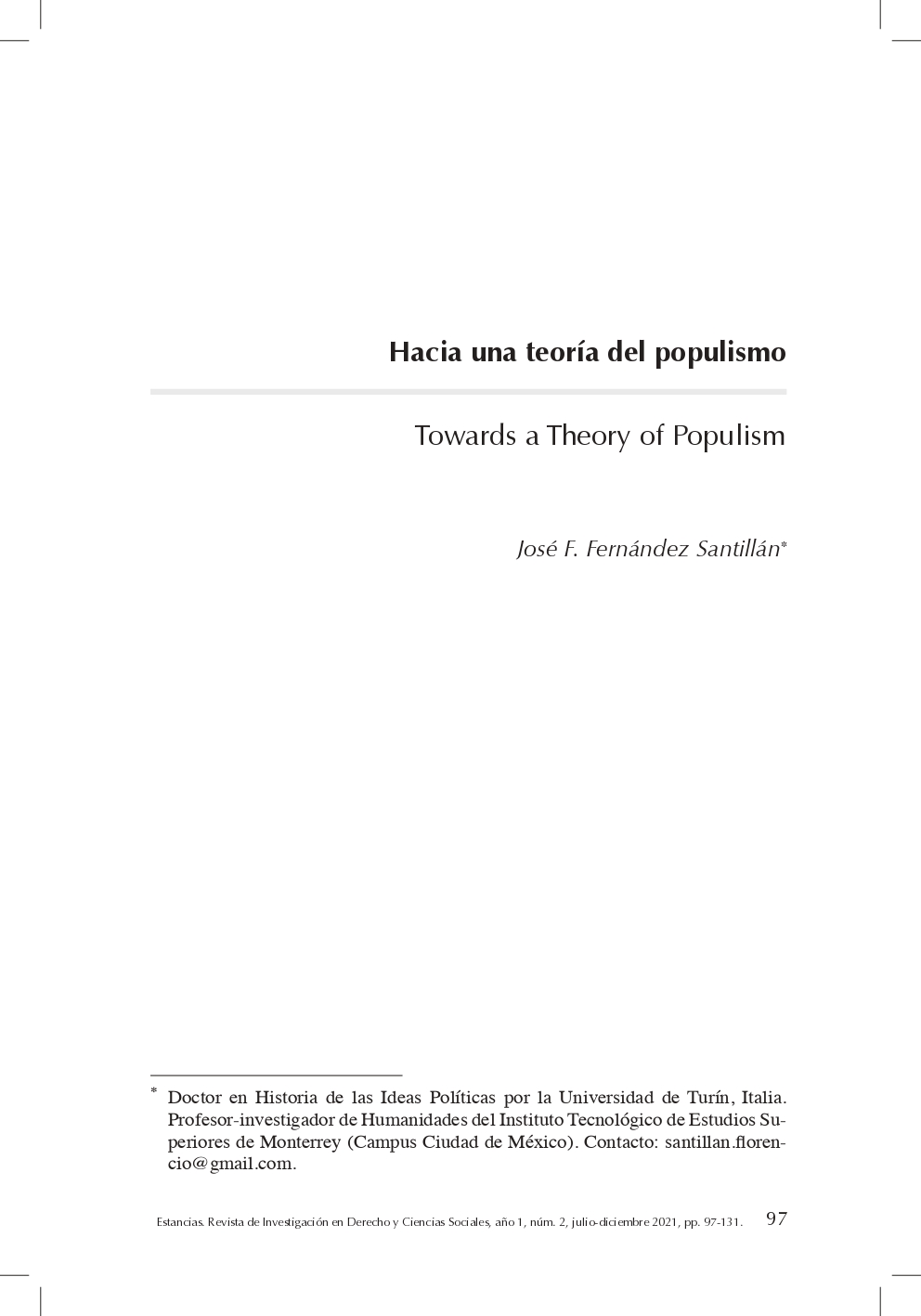Towards a Theory of Populism
Main Article Content
Abstract
Any understanding of contemporary politics that wants to be taken seriously must find a way to deal with populism. It is a political phenomenon that has happen all over the world. Obviously, many books have been written about this topic Nevertheless, there is not a least common denominator about its reach and meaning. Almost all authors accept that ‘populism’ is an imprecise, problematic and polysemic concept. This article sustains, conversely, that it is possible specify what is populism. In consequence, it is likely to elaborate a theory of populism. This effort is important not only for the academic field, in specific humanities, social science, public policy and political science but also in order to protect liberal democracy against many misinterpretations and manipulations like that of speak about a “populist democracy”, which is an oxymorus. This confusion has been consciously provoked by those scholars, ideologues, politicians and political parties, pro-populism. There is a key solution for this challenge. It means, what Norberto Bobbio named “the lesson of the classics”.
It is about a different perspective in comparison to that approach adopted by the authors “specialists” or “experts” in populism.
Article Details

This work is licensed under a Creative Commons Attribution-NonCommercial 4.0 International License.
How to Cite
References
Abbagnano, N. (1992), Dizionario di Filosofia. Turín: UTET.
Aristóteles (1988). Política. Madrid: Gredos.
Berlin, I. (2014). Pensadores rusos. Madrid: Alianza Universidad.
Bobbio, N. (1991). Il futuro della democrazia. Turín: Einaudi.
Bobbio, N. (2014). La teoría de las formas de gobierno en la historia del pensamiento político. Ciudad de México: Fondo de Cultura Económica.
Bushkovitch, P. (2012). Historia de Rusia. Madrid: Akal.
Frum, D. (2019). What the Muller Report Actually Said. The Atlantic. 29 de mayo. Recuperado de: https://www.theatlantic.com/ideas/archive/2019/05/ mueller/590467/.
García Jurado, R. (2015). República o democracia: la Florencia de Maquiavelo y Savonarola. Revista Estudios, XIII (114), 9-35.
Inglehart, R., y P. Norris (2016). Trump, Brexit, and the Rise of Populism: Economic Have-Nots and Cultural Backlash. Harvard University,
Kennedy School, Faculty Reseach Working Papers Series. Recuperado de: https://www.hks.harvard.edu/publications/trump-brexit-and-rise-populismeconomic-have-nots-and-cultural-backlash.
Judis, J. B. (2016). The Populist Explosion. How the Great Recession Transformed American and European Politics. Nueva York: Columbia Global Report.
Kakutani, M. (2018). The Death of Truth. Nueva York: Tim Duggan Books.
Krastev, I. (2020). The Populist Moment. Recuperado de: http://www.eurozine.com/articles/2007-09-18-krastev-en.html.
Lukacs, J. (2005). Democracy and Populism. Fear and Hatred. New Haven: Yale University.
McMath, R. (1993). American Populism. A Social History 1877-1898. Nueva York: Hill and Wang.
Moffitt, B. (2016). The Global Rise of Populism. Performance, Political Style, and Representation). Stanford, Ca., Stanford University Press.
Machiavelli, N. (1971). Tutte le opere. Florencia: Sansoni.
Machiavelli, N. (1950). Tutte le opere, Milán: Mondadori.
Maquivelo, N. (1993). De Principatibus. Edición bilingüe. Traducción, notas y estudio introductorio de Elisur Arteaga y Laura Trigueros Gaisman. Ciudad de México: Trillas.
Maquiavelo, N. (2016). Discursos sobre la Primera Década de Tito Livio. Madrid: Akal.
Müller, J.-W. (2016). What is Populism? Philadelphia: University of Pennsylvania Press.
Pappas, T. S. (2019). Populism and Democracy. A Comparative and Theoretical Analysis. Oxford: Oxford University Press.
Platón (2017). El Político. Ciudad de México: Porrúa.
Savonarola, G. (2018). Trattato sul governo di Firenze. Montevarchi: Digital Soul.
Schmitt, C. (2007). The Concept of the Political. Chicago: Chicago University Press
Stengler, F. A., D. B. MacDonald y D. Nabers (2019). Populism and World Politics. Exploring Inter- and Transnational Dimensions. Londres: Palgrave MacMillan.
Taggart, P. (2000). Populism. Buckingham & Philadelphia: Open University Press.
Urbinati, N. (2019). Me the People. How Populism Transforms Democracy. Cambridge, Mass.: Harvard University Press.
Villari, P. (2016). The Life of Girolamo Savonarola. Seattle: Zhingoora Books.
Wolff, M. (2018). Fire and Fury. Inside the Trump White House. Nueva York, Henry Holt and Company.
